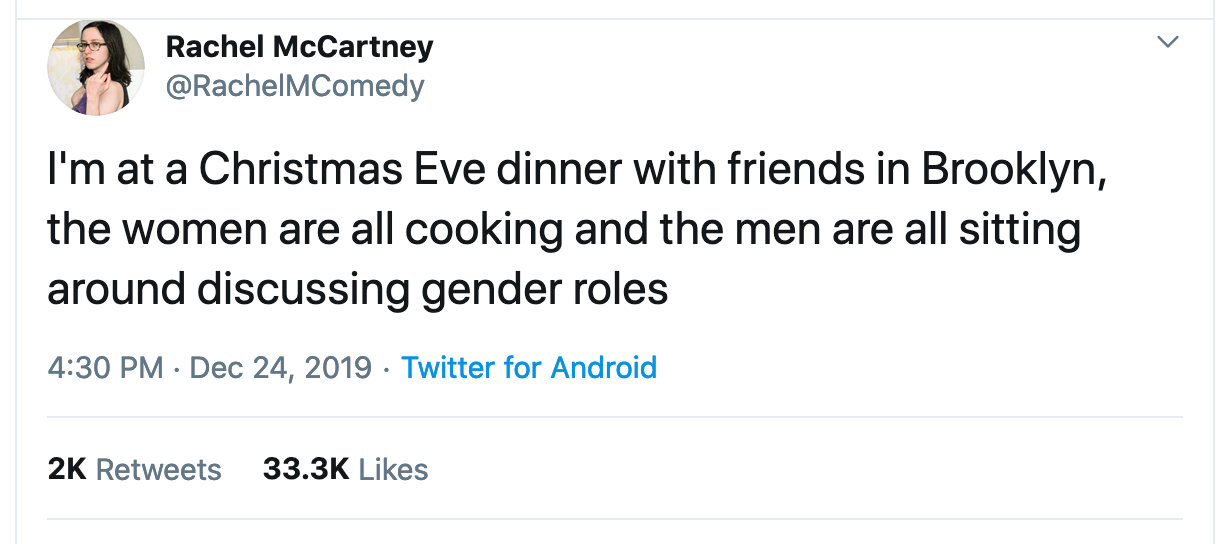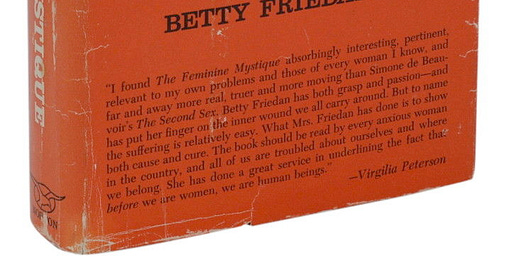Why is this interesting? - The Feminine Mystique Edition
On housework, technology, and Betty Friedan
Anita Schillhorn van Veen (ASVV) is a friend of WITI and has a few other WITIs under her belt (Climate Tourism, Utopias, and Diamonds). She’s an independent strategy consultant with Frame Strategy, based in LA and New York. You can follow her on Twitter here.
Anita here. As we rounded the corner of a new year, I spent a lot of time resolving to be more productive, more connected, more self-caring. One of the conclusions I came to is that all of these resolutions rest on one foundation: a more organized home. Not only do my husband and I like to entertain, cook, and (try to) keep our lives sorted at home, I also spend plenty of working hours at my kitchen table, and keeping the homefront in order is paramount to productivity in other areas. The time committed to this exercise in organization often erodes the time I want to commit to bigger things.
Enter technology. We have a Dyson, a Roomba, an Instant Pot, a Zojirushi rice cooker, a temperature-controlled electric kettle for my morning pourover, a Vitamix blender, and cabinets full of other contraptions that claim to make life a little easier. Not only that, we have a cleaning lady that comes a couple of times a month, our gardening is taken care of by the super, and my husband and I are committed to sharing housework equally. Yet finding the time to make resolutions, much less complete them, is a challenge.
Derek Thompson at The Atlantic tackled this phenomenon recently by exploring why Americans still feel like they have no time, even with the glut of technology solutions for time-saving. The crux of his argument is this:
Americans tend to use new productivity and technology to buy a better life rather than to enjoy more downtime in inferior conditions. And when material concerns are mostly met, Americans fixate on their status and class, and that of their children, and work tirelessly to preserve and grow it.
Why is this interesting?
Thompson focuses his story on unpacking America’s history with time-saving technologies, and in the course of his argument, he elides “Americans” with “housewives” over and over again. Per the piece:
Housework hours finally fell only when women joined the labor force en masse. Since the 1960s, the share of women in the workforce has increased by about 50 percent. In that time, the typical adult woman has decreased her housework hours by about one-third, according to analysis by the economist Valerie Ramey. That is, the one thing that finally reduced labor in the home was … labor outside of the home.
This is part of the argument that Betty Friedan made in her landmark book The Feminine Mystique in 1963. She studied women who worked as housewives (here I’m being deliberate about separating gender from work identity) in comparison to women who worked in professional spheres, and found that women who worked outside the home completed the same amount of home tasks in less time than those who worked in the home. In reference to the number of hours it takes to keep house, she writes:
When you look at it this way, the double deception of the feminine mystique becomes quite apparent:
1. The more a woman is deprived of function in society at the level of her own ability, the more her housework, mother-work, wife-work, will expand—and the more she will resist finishing her housework or mother-work, and being without any function at all. (Evidently human nature also abhors a vacuum, even in women.)
2. The time required to do the housework for any given woman varies inversely with the challenge of the other work to which she is committed. Without any outside interests, a woman is virtually forced to devote her every moment to the trivia of keeping house.
First Edition of Betty Friedan’s world-changing book The Feminine Mystique. Source: Burnside Rare Books
I’m surprised Thompson didn’t reference Betty Friedan in his article; after all, her book is a famous turning point for the “housewife,” and sparked second-wave feminism by articulating the malaise that many women felt in relation to this limited role in society. Friedan made the same argument as Thompson, and thereby catalyzed women to seek professional fulfillment.
I imagine Friedan and Thompson would further agree on another point he makes: That, as Thompson puts it, “a lot of modern overwork is class and status maintenance.”
The crux of what Friedan argues is that women in the 1950s and early 1960s had to fulfill the status of what women were supposed to want—a beautiful home, perfect children, a happy husband. A woman’s entire status was wrapped up in the perfection of home, which was defined by the media of the day, magazines. Not to say that the men of the day did not want that status as well; they were just not on the hook for making it happen.
Today isn’t so different. Mommy bloggers, celebrity families, and social media perpetuate images of a perfect home life, or even more so, a perfect home-career balance. Thompson tells us that the increase in time-saving technology fuels more focus on status maintenance, and the standards of status continue to rise as we get more intimate glimpses of people’s lives on social media. This balance still often falls on the shoulders of women to maintain. Even as women take on more professionally, they continue to manage the bulk of unpaid housework, and those that can afford it come to rely on the even more invisible labor of domestic workers.

A holiday tweet by comedian Rachel McCartney, shared with me by fellow WITI writer, Perry Hewitt.
We’ve just come through the holidays, peak season for showing off social status, and a time that the American Psychological Association says is more stressful for women. Festive decor, perfect meals, generous gifts for well-groomed children, and family portrait holiday cards are all primarily fueled by women’s labor. So as we start to use the Air Fryers and Alexas that we got under the tree, it’s worthwhile to note that the latest technologies don’t necessarily herald innovation on the homefront. (ASVV)
Extinction of the Day:
The Chinese paddlefish, one of the world's largest fish, has gone extinct due to “overfishing and a degraded habitat.” (CJN)

Quick Links:
Texas Monthly on The Art of Racing Pigeons (NRB)
A primer on the current strife in the romance writer’s community (NRB)
Thanks for reading,
Noah (NRB) & Colin (CJN) & Anita (ASVV)
Why is this interesting? is a daily email from Noah Brier & Colin Nagy (and friends!) about interesting things. If you’ve enjoyed this edition, please consider forwarding it to a friend. If you’re reading it for the first time, consider subscribing (it’s free!).



